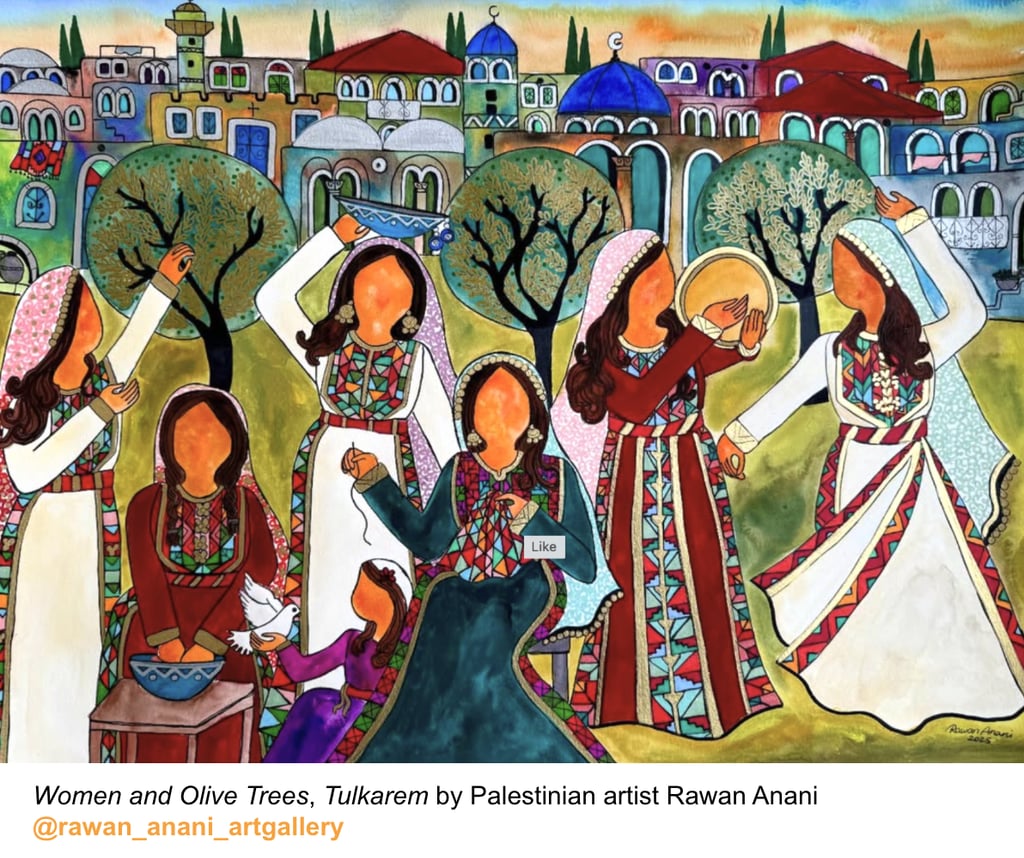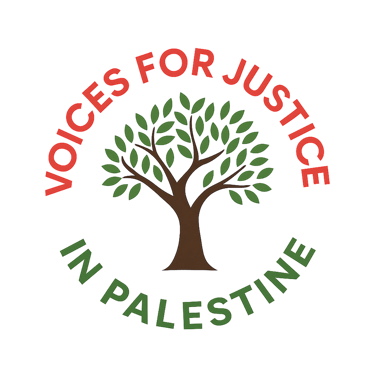Life Under Israeli Military Occupation: Testimony from My Birthplace in Palestine
VJP Board Chair Dr. Burhan Ghanayem returns to his hometown of Tulkarem and describes the full machinery of Israel’s military occupation, from land theft and home demolitions to daily humiliation, arguing that Palestinian steadfastness itself is an act of resistance.
Dr. Burhan Ghanayem
8/21/20256 min read


This week, we are sharing a powerful article by our Board Chair, Dr. Burhan Ghanayem. Burhan lived in the village of Kufr Zeebad and went to school in nearby Tulkarem. He recently returned to his birthplace in Occupied Palestine and offers these reflections.
I returned earlier this month from the Palestinian West Bank, my birthplace, where my family of origin still lives. What I saw and heard of the daily horrors of Israel’s military and settler-colonial occupation shook me deeply, even though I was born into this reality, have visited often for decades, and carried it with me all my life. The occupation is not an abstract idea. It is a daily, suffocating reality that dominates every aspect of Palestinian life. It is a system built on land theft, property seizures, endless checkpoints, and the constant threat of settler violence. Entire communities live under the shadow of ethnic cleansing: families uprooted, homes demolished, villages encircled by illegal settlements.
Israel’s military occupation of the West Bank is an Israeli state-financed system of discriminatory laws and violent practices carefully designed to fragment Palestinian society, seize land, and force people from their homes. The world’s foremost human rights organizations (Amnesty International, Human Rights Watch, Yesh Din, B’Tselem, and Al Haq) have documented all the ways it meets the definition of an apartheid system.
Land Theft and Settlement Expansion
Since 1967, Israel has taken vast stretches of Palestinian land through military orders, ‘state land’ declarations, and outright theft. My family’s treasured farm was stolen more than a decade ago and, like countless others, turned into an illegal settlement. The West Bank was supposed to form the heart of a Palestinian state under the Oslo Agreement, but today 75% is reported to be under Israeli control. More than 150 Israeli settlements and 100 outposts now dominate the land, linked by settler-only roads and tunnels that cage Palestinians into disconnected enclaves. Over 800,000 settlers have been moved into the West Bank in clear violation of international law, most of whom are supported by U.S. subsidies and act as full-time militias determined to make daily life unbearable for Palestinians in order to drive them from their homes.
Home Demolitions and Displacement
One of the most devastating tools of the occupation is the demolition of Palestinian homes. Families live in constant fear of receiving a demolition order, often for the 'crime' of building without an Israeli-issued permit, which is nearly impossible to obtain. Entire neighborhoods have been razed, leaving children traumatized and families homeless. Demolitions are also used as collective punishment against relatives of Palestinians accused of resistance, a practice condemned under international law. It is estimated by the Israeli Committee Against House Demolitions (ICAHD) that Israel has demolished 59,367 Palestinian homes in East Jerusalem and the West Bank since 1967.
Tulkarem Refugee Camp
I bear witness to the tragedy unfolding in Tulkarem Refugee Camp. I testify so the world cannot later say it did not know. Israel has reoccupied the camp, forced out its residents, and sealed it off completely. Families who lived there for generations have been uprooted, their homes and livelihoods erased. Today, the destruction continues. Houses, shops, schools, mosques, and public spaces are reduced to rubble. This is not a military operation; it is the deliberate erasure of a community, an act of ethnic cleansing. Similar devastation has struck the Jenin and Nur Shams refugee camps. My brother told me that only weeks before I arrived, a large army vehicle sped through the camp’s narrow streets, crushing a small passenger car. The driver, a high school teacher, was killed instantly. His wife was left severely injured. When I asked my brother what people did, he answered: "We prepared the teacher’s body, buried him, and moved on. There is no one to appeal to, no one to hold accountable. The killers remain unknown."
Checkpoints and Movement Restrictions
The West Bank is laced with hundreds of fixed checkpoints, gates, and military towers, in addition to “flying checkpoints” set up without warning. I was caught in one for hours during my visit. Palestinians must endure long waits just to pass from one village to another. Soldiers and settlers, working hand-in-glove, subject them to humiliation, harassment, or outright denial of passage. Pregnant women have been forced to give birth at checkpoints. Patients have died waiting for permission to reach hospitals. These checkpoints are not about security, but about control, sending the message that freedom of movement can be denied at will.
Settler Violence
Palestinians live under constant threat from armed settlers who act with near-total impunity. Settlers torch fields, burn homes, uproot olive trees, poison livestock, vandalize mosques and churches, and physically assault farmers, children, and elders. Soldiers often protect the settlers or join in their attacks. A new tactic has emerged: settlers bring cattle from faraway places to graze on Palestinian farms, destroying crops that took months to cultivate. They also release wild boars into fields, devastating harvests and uprooting trees. One of the ugliest stories I heard was of settlers waiting until Palestinians finished harvesting olives, then ambushing them, beating them, and stealing their harvest. These acts of violence have recurred throughout the history of the occupation. They are a decades-long strategy to break the bond between Palestinians and their land.
Military Raids and Looting
Raids are a daily and nightly reality. Soldiers storm towns and camps, often in the middle of the night, smashing doors, ransacking homes, and dragging people from their beds. Families return to vandalized houses, sometimes even defiled with urine and excrement. In recent months, soldiers have increasingly looted homes and checkpoints, stealing cash, gold, and other valuables. In some cases, soldiers or settlers order families to leave their homes for several days, telling them to take their valuables with them. As the families step outside carrying jewelry and cash, the soldiers or settlers stop them at the door, search their bodies, and steal what they are carrying. Similar thefts occur at checkpoints, where Palestinians are subjected to body and vehicle searches, only to have their money and jewelry taken. Haaretz reported on August 7th that this wave of theft extends even to children’s piggy banks. There is no impartial authority to whom Palestinians can report these crimes. Israeli officials are often directly involved. There is no accountability, no possibility of justice.
Imprisonment
Thousands of Palestinians, including minors, are held in prisons inside Israel, far from their families: another violation of international law. Many are detained indefinitely without charge under “administrative detention.” Torture, frequent beatings, and solitary confinement are common. Credible accounts describe Israeli guards sexually assaulting Palestinian prisoners. Nearly every Palestinian family has experienced imprisonment. It is estimated that one in five Palestinians has been jailed at some point in their lives.
Environmental Destruction
Israel is also destroying the land itself. Over 250,000 olive and fruit trees have been uprooted. Settlement sewage is deliberately dumped onto Palestinian farmland. Near my village, I saw stone quarries on stolen land, run by Israeli companies. Heavy trucks destroy Palestinian roads, while natural resources are exploited for Israel’s benefit. My nephew must change his car tires every six months due to the ruined roads between our village and Tulkarm. Water is weaponized. Wells are seized or destroyed. In a nearby village, the army confiscated equipment for a newly dug well, poured concrete into it, and declared the area a closed military zone.
Economic Strangulation
Before October 2023, the paucity of economic opportunities in the West Bank forced up to 160,000 Palestinians to find work in Israel or in the settlements. Many young people abandoned education, a prime Palestinian value, to help their families survive. Since October 7, 2023, Israel has denied all but 15,000 West Bank Palestinians permits to work in Israel, plunging communities into even deeper poverty. This dire economic situation rips at the heart of Palestinian society. Palestinian workers suffer the humiliation of having to work for those who are oppressing them, and not being able to pursue higher education threatens to corrode one of the most highly-educated populations in the Middle East.
Psychological Warfare
The occupation inflicts deep psychological wounds. Families live in constant fear of raids, arrests, and humiliation. Children grow up with nightmares of soldiers bursting into their homes. Parents carry the anguish of being unable to protect their loved ones. It is a deliberate effort to break the Palestinian spirit and force people into despair or exile. Recent psychiatric studies report excessively high rates of depression and anxiety, especially among Palestinian children.
Witness and Resistance
What I witnessed is a system of pervasive abuse. The occupation is surgically designed to make Palestinian life unbearable: land theft, demolitions, uprooted trees, desecrated places of worship, checkpoints, raids, imprisonment, and displacement. Israel has been carrying out ethnic cleansing since 1947, family by family, village by village. The pace of destruction and expulsion has escalated dramatically since October 7, 2023. Palestinians resist simply by living: planting new olive trees where old ones were destroyed, rebuilding homes, raising children, celebrating weddings and graduations, staying on the land. This defiance and steadfastness—sumood—is the most powerful act of resistance.
On my last night in Palestine, my oldest brother, a retired school principal, spoke of the nightmare of seeking kidney dialysis three times a week in nearby cities, often delayed by checkpoints. He told me that in his nearly 80 years, nothing that happened to the Palestinian people would have been possible without the financial, military, and political support of America and Europe. Then he asked: “What do Israel and the U.S. intend to do with the more than seven million Palestinians between the Jordan River and the Mediterranean Sea?” Before I could answer, he added: “Do you think the genocide in Gaza will also be carried out in the West Bank?" Two years ago, I told him I believed Israel would not be permitted to commit genocide against Palestinians. Sadly, today, I no longer believe America will do anything to stop it.
